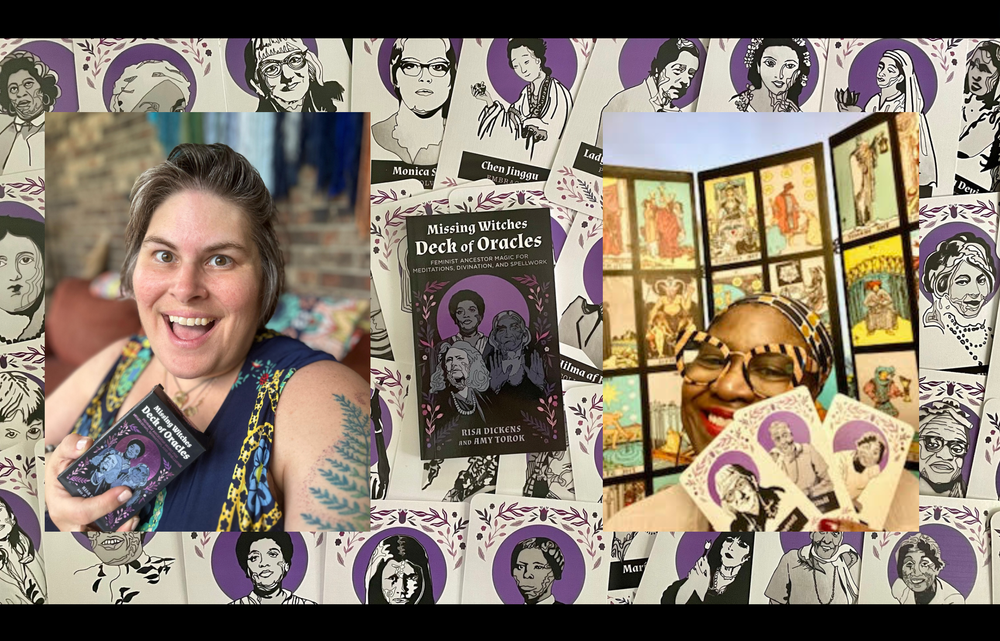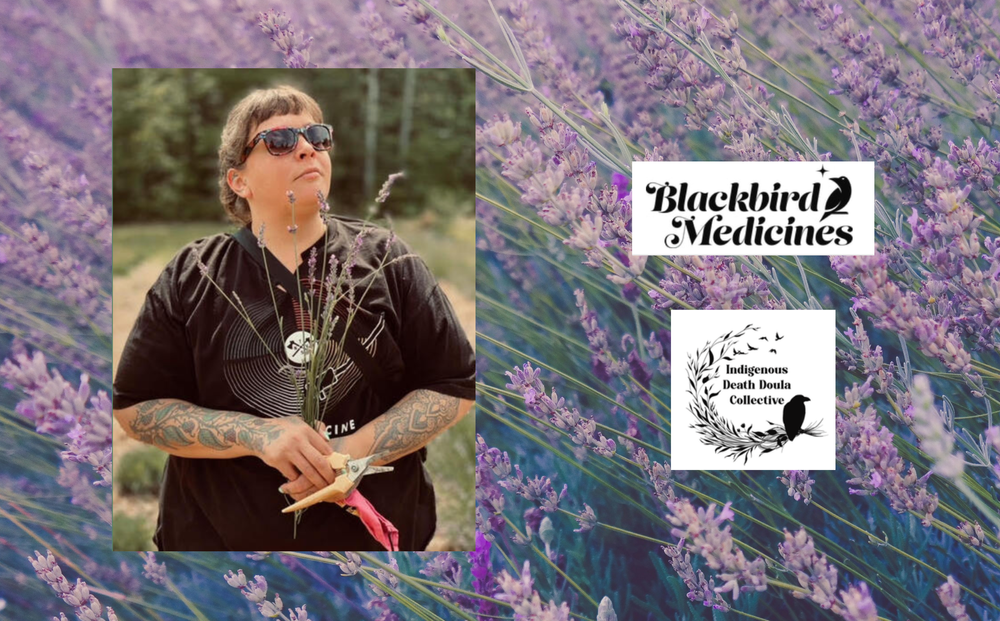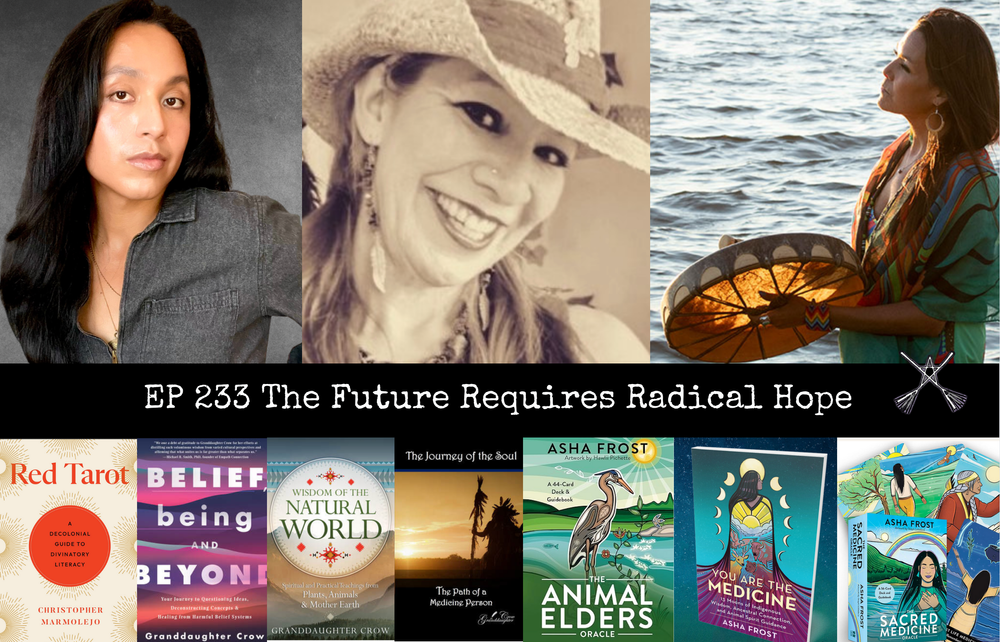"Let's all take a deep breath together right now.
I mean, there are a million quotes out there. I think it was Vonnegut who said that the existence of music is the only proof of God's existence that he needed. And Nietzsche said the people who were dancing were thought to be crazy by those who could not hear the music. There's definitely a massive relationship between creativity and witchcraft in general, I think, but especially when it comes to music, even if you think about like a minor chord versus a major chord, you hear emotion. People recognize emotion in dance without facial expression, without lyrics, and music itself comes down to a very witchy word which is frequency and our vibrations and our vibrational levels. A G note is great, you know, and a G sharp is also great when you play them together it might not sound so great, but this is not a judgment call about the validity of G or G sharp.
I think that's something that I've taken into my normal life, in relationships, just because these two things don't go together doesn't make either one of them good or bad. It just means they're discordant."
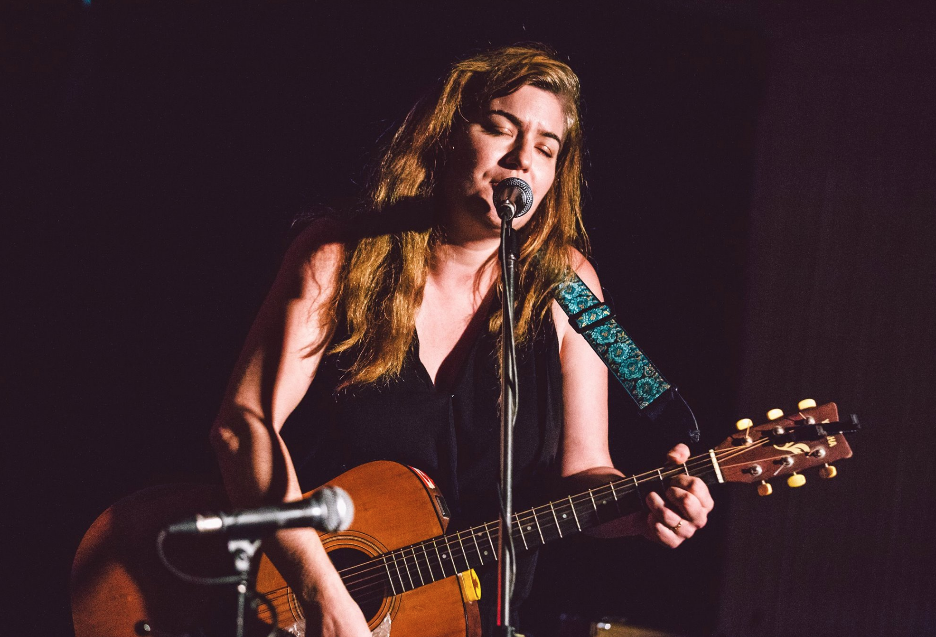
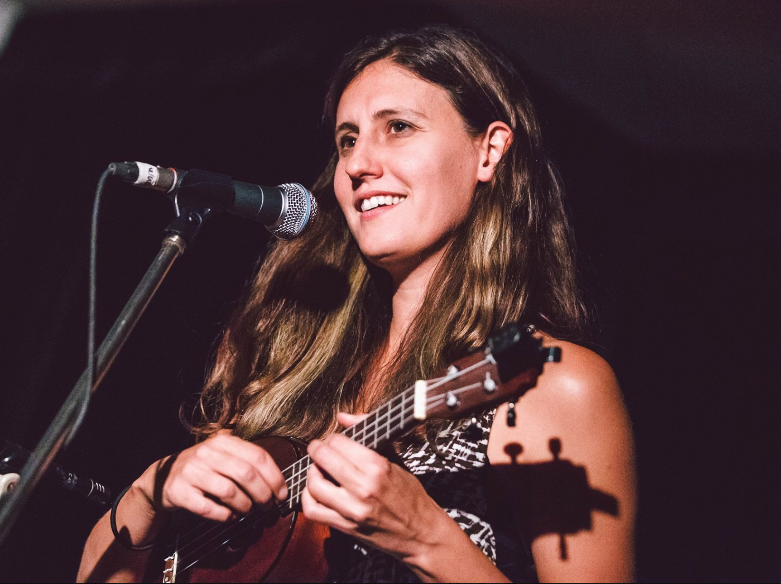
Above: (2015) Amy and Risa perform at the launch of Risa’s EP which Amy produced and arranged! Our first collaborations were always musical!!
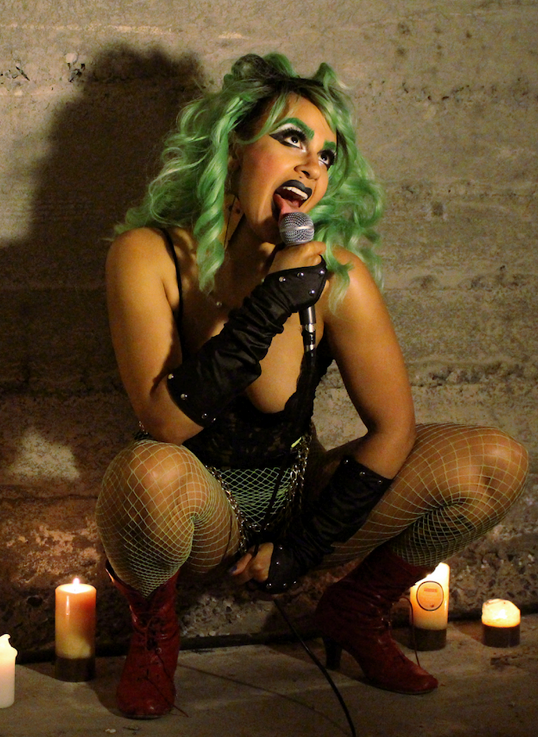
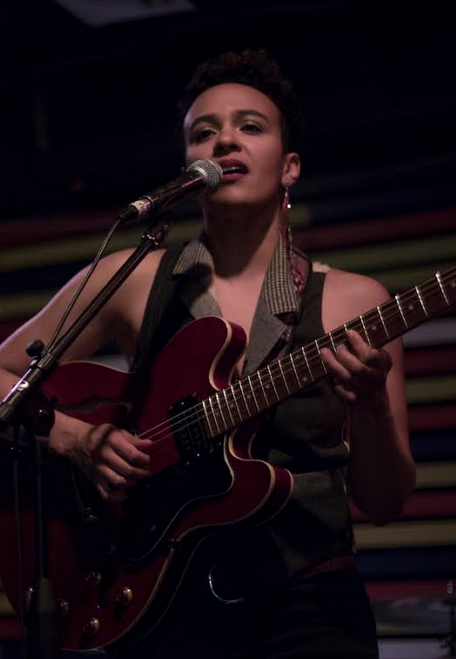
__________________________________________________
Monefa: Sehkmet’s Visions Website on Instagram and on Facebook
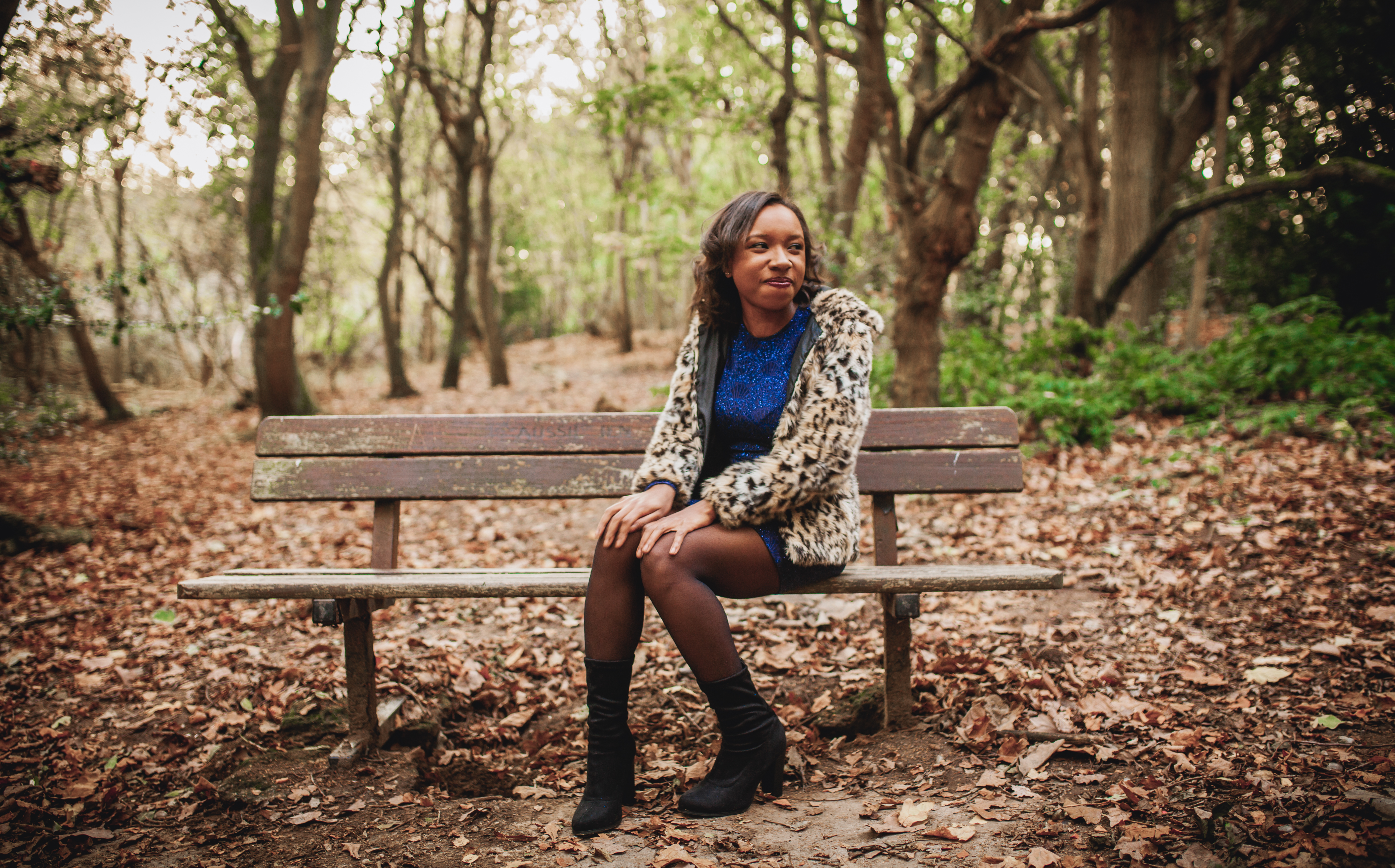
________________________________________________
Alex Robshaw: Website and on Instagram
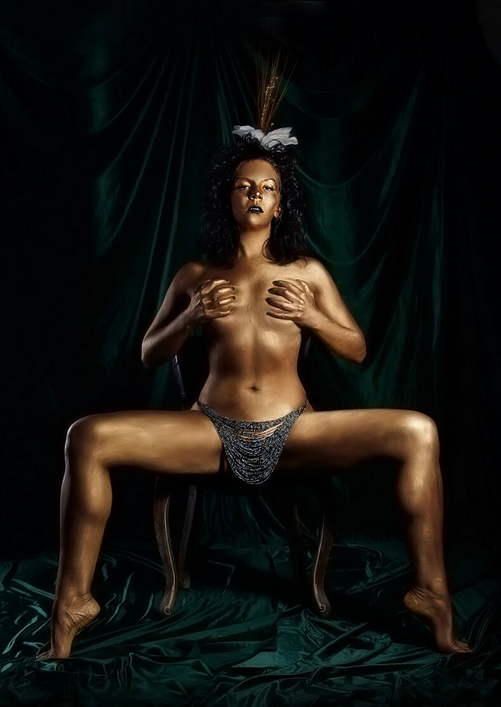
______________________________________________
Featured Music:
Shine On, Moon by Amy Torok
Heart of Fire feat. Annie Lamoureux by Amy Torok
Red by Alex Robshaw (track 11)
Who Were the Witches? by Bonnie Lockheart
(Cover version in the episode recorded by Amy Torok)
______________________________________
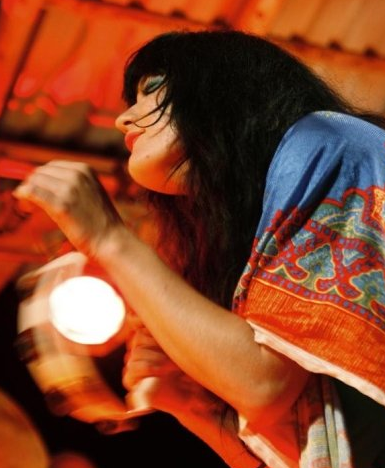
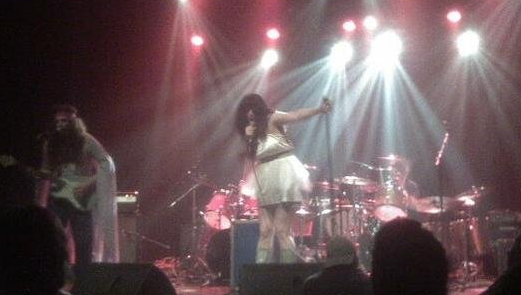
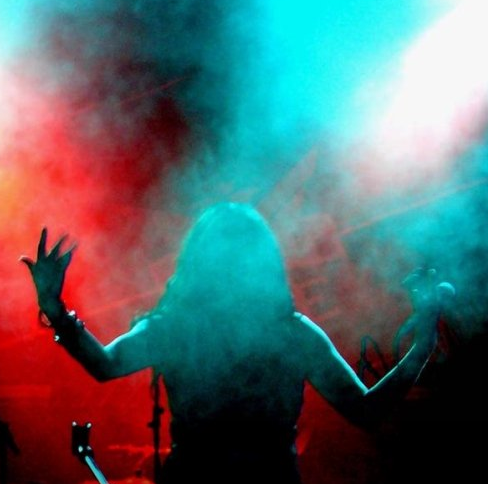
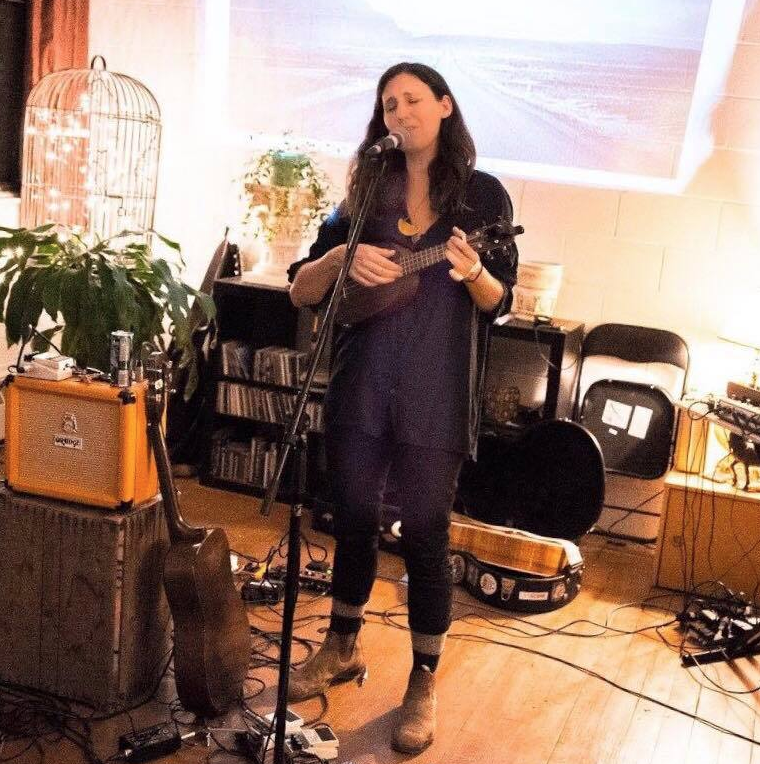
SEE MISSING WITCHES LIVE MAY 19TH, 2019 IN MONTREAL
LINKS Music and the Brain:
https://www.hopkinsmedicine.org/health/wellness-and-prevention/keep-your-brain-young-with-music
Transcript
Beltane
[00:00:00] Amy: Bonjour belte. Bonjour belte.
Salut, bienvenue.
[00:00:04] Risa: Welcome back to the Missing Witches podcast. That's Amy.
[00:00:07] Amy: And that's Risa. Thanks for
coming. Music
witches, music as magic. I talked to a bunch of witches who are also musicians. Before we dive in, we've got a very exciting announcement. If you are in the Montreal area, Get ready for the first ever Missing Witches live event.
May 19th, we'll be paying tribute to Monica's show by singing The Burning Times in a church and exploring the theme of Dance as Divine Feminine in Alive Missing Witches and Witches Found as part of the International Gnostic Conclave, which is happening in Montreal this year. So again, if you're in the Montreal area, please consider coming out to our first ever live event.
It's pay what you can and all the proceeds are going to the Native Women's Shelter of Montreal. That's the afternoon of Sunday, May 19th in Montreal. Keep an eye on our Facebook, Twitter, and Instagram for details. Blessed Be.
Thing is shining around you, the rain falls, silence upon you, the grass sways humbly around you, shine on your redemption and you will understand.
Belt .
What's your Beltane, what was your belting?
Happy Beltane Mayday also, um, like a labor?
[00:02:23] Risa: Yeah. Important Labor Day, union Day. Mm-Hmm. . Also the day of my first date with my partner and the name of my baby. Oh.
May day. Uh, yeah.
[00:02:33] Amy: Oh, so Mayday is especially special?
[00:02:36] Risa: Yes, and she's named after my two grandmothers.
Definitely witches. Not, not in the, not in the usual sense, but, um, you know, fighting the Nazis and the Danish underground at 16.
[00:02:52] Amy: So let's conjure that bonfire magic of Beltane and feel the heat from the bonfire. Now one of the fieriest things that I think in human existence is music. Yeah. I mean, I'll,
[00:03:05] Risa: I'll.
The last bonfire I was at with you, we, we sang all
[00:03:08] Monefa: night long. Which is not
[00:03:10] Amy: uncommon, especially for us, but bonfires in general tend to have that, you know, sing along campfire songs. We call them campfire songs and folk songs.
[00:03:20] Risa: All of our like improvised magic together started with
[00:03:23] Amy: singing. Well, first of all, we met because Risa and I met.
Backstage, a friend of ours, Krista Muir, if you're listening, shout out. Um, she hosted a, uh, what she called a ukulele bizarro event that she did two or three times, I think. And Risa and I both play the ukulele, and we both ended up on the bill, and we ended up in the green room alone together at one point.
And I can't remember how the conversation started. Probably something like, Hey, you also play the ukulele. And then we started hanging out and a lot of our early hangouts were almost like exclusively like, let's get together. And almost
[00:04:01] Risa: just a lot of like, um, yell singing Beyonce.
[00:04:07] Amy: Because, I mean,
[00:04:09] Risa: which, you know, that'll take you, take you right down to Satan or
[00:04:13] Alex: right up to the divine feminine.
[00:04:15] Monefa: You can just ride that
[00:04:16] Amy: either way. Yeah. Just like making noise of a musical fashion. It's almost like, you know, like scream therapy, except it's less aggressive. You know, your neighbors aren't gonna react as concernedly.
[00:04:32] Risa: And you're like actively trying to listen to each other and to Get out of your own way so that it get the closest distance between listening and being able to respond in a way that's harmonious so that not necessarily even to harmonize it.
A crystal mirror will just harmonize you to the ground, whatever sounds you're making. Um, but just to sound okay, just to sound okay together to sing the melody
[00:04:57] Amy: together or not. Okay, to experiment and just sing whatever note comes out and be willing to like. Take that risk of failure and the sourness. Oh
[00:05:08] Monefa: man,
[00:05:09] Risa: and to be, um, loud enough to be, to take up space enough, you know, to fill yourself with oxygen, to push out oxygen, like to breathe in the right place, to notice what it feels like to be in the pocket of breathing in the
[00:05:23] Amy: right place.
Let's all take a deep breath together right now.
I mean, there are a million quotes out there. I think it was Vonnegut who said that the existence of music is the only, um, proof of God's existence that he needed. And, uh, Nietzsche, I think, said something similar. And he very definitely said the, the The people were, um, the people who were dancing were thought to be crazy by those who could not hear the music, you know, so there's definitely a massive relationship between creativity and witchcraft in general, I think, but especially when it comes to music, even if you think about like a minor chord versus a major chord, and maybe I'll, maybe I'll put some music in so you guys can hear what I'm talking about.
You hear emotion. You can. very concisely and science will back me up on this like people recognize emotion in dance without facial expression in music without lyrics and it really come music itself comes down to a very witchy word which is frequency and our vibrations and our vibrational levels and sometimes you know there's Like a G note is great, you know, and a G sharp is also great when you play them together it might not sound so great, but this is not like a Judgment call about the validity of G or G sharp.
I think that's something that I've taken into my normal life is just because You know, in relationships, just because these two things don't necessarily go together doesn't make either one of them good or bad. It just means like they're discordant, you
[00:06:59] Risa: know, yeah, you might love that G sharp next to, uh,
[00:07:04] Amy: yeah, put it next to a C sharp and you're golden.
It's the perfect match. Yeah, yeah. So there is again, the alchemy, there's so many like witchy ideas that can come up when you. Talk about music, inspiration, yeah, possession, possession is a big one. Yeah. Not owning things, but being taken over by, uh,
[00:07:24] Risa: and, and owning things like, do you, what I think about that when I write songs, when the songs are other people's stories, you know?
Cause it's my, it might be my grandmother's story or which I, you know, Denon or my cousins or whatever. And then the songs themselves. Feeling like they want to talk about, uh, who's story you're allowed to tell, you know? And then feeling like when you're singing, you're doing something that is so many hundreds of thousands of years bigger than you.
You know, the whales sing and the spears sing,
[00:07:59] Alex: so. For
[00:08:00] Amy: sure. We were vocalizing. Likely before we were even banging sticks
[00:08:05] Monefa: on, in
[00:08:06] Risa: some ways we're just madder being sung, you know, because it's your little bit of energy through you for a wave for a while,
[00:08:14] Amy: you know, singing and being sung. Yeah. So, I mean, that's what gets me fired up.
Back to the bonfire is, uh, that there are some songs that I will labor over. And then there are some songs that almost literally just write themselves, you know, a turn of phrase comes into your head and you sit down and you pick up your instrument and the song just comes out and it might need some tweaking and tailoring and adding and subtracting.
But like, You know, the hook or that happens
[00:08:42] Alex: to
[00:08:43] Risa: you more than it happens to most people. Yes. Do you think that that is because you have opened a portal for it?
[00:08:53] Amy: Do you think it's because you're an open portal? Maybe I would love to think that that's true. Gosh. I thought I, I mean, I've heard this from other songwriters and artists before that maybe it was, um, Who was it?
Who's the guy with the voice like this and he sings like this? Tom Waits. Tom Waits. I think it was Tom Waits who, uh, he was telling a story about how, how songs come to him, like, as if from the sky. And sometimes he'll be driving his car and one time he'll be like, no, please, you know, just wait till I get home.
I have not, I can't write you, I'm driving, you know, please come back. Or
[00:09:29] Alex: the,
[00:09:30] Risa: I can't remember who this quote is by, but my Dad would always say this to me, that the Difference between a writer and everybody else is that a writer gets up and writes it down.
[00:09:39] Amy: But there's something more going on to art than certainly just the application of the paint.
[00:09:43] Risa: And do you think it is divinity? Do you think it's, it's waves in nature? When it happens to you and you're like, that's a song.
[00:09:52] Amy: I don't see the difference between divinity and waves in nature. I know that. Me neither. I set it up. You set me up. You set me up. Yeah, I mean. Again, like I didn't question that.
This was just something until you just told me right now that that's unusual. , you know, I,
[00:10:07] Risa: I say it's unusual only because, or I think that you think it's more common than it is because your context is mostly artists.
[00:10:16] Alex: Right? And so I like to surround
[00:10:18] Amy: myself by those people.
[00:10:19] Risa: I think, I think I've been thinking about that a lot, that a lot of what I, what you think is normal is what your context
[00:10:24] Amy: is.
Oh, across the board, right. In all forms of all life. Yeah. Yeah. Normalization is a. a lot of things. And sometimes, you know, it's good because it makes you think that, you know, that's what the world is like. Everybody's just getting songs downloaded into their heads. I mean, but I'll tell you like one of the songs that our own, maybe I'll include a clip of it, um, was because I had such a.
dumb moment where I was thinking about the moon and I was thinking about moonlight and I was like, I thought to myself, like, well, the moon gets its shine from the sun, right? I'm just thinking this in my head and I'm like, I'm pretty sure that's true. But you know, you have those ones. So I Googled it, and then I, of course, that's where the moon gets us.
And then, um, Save you a Google there. The shine on the moon's a reflection of you, you're the sun. And that was that. And then I wrote that song that day. But that line, as it was, was because I was dumb. Because I was like. Where does the light come from? And I really had to like, and then, I mean, so, you know, I'm not even saying that this is like a reward.
Sometimes it's a reward for dumbness. For dumb luck, yeah. But like, where does the light come from? And then something happens between the thought and the next thought that renders it musical. And I think, I mean, I'm somebody that hears music constantly, whether it's like auditory hallucinations, or the repetitiveness of machines.
There have been so many times where I heard like this beautiful, uh, And I went searching for it and it turned out to be like a work truck in my neighborhood. But the, when it comes into my head, it's like, and I'm like, Ooh, you know, Chris, tell me more. So I think that the universe is quite musical. Um, not just the music part of it, but like we were talking about, like the harmonies of frequencies and how, because music is math.
It's art. It's art, it's science, it's, you know, uh, there have been so many studies done about how good music is for your brain, how important it is to teach kids music, how these skills of learning either to play musical instruments or one of my friends just put her son in singing lessons. So we had a big chat about like, not just singing, which is obviously.
The most amazing thing that you can do
[00:12:54] Risa: with your free time. Yeah, singing together extends
[00:12:56] Amy: your lifespan. Oh, there's so much. And you know what? I'll gather up a couple and we'll drop some stuff in the, uh, show notes. Because the science on this is,
[00:13:06] Monefa: I mean, it's undeniable. C'est bien, tabi. But also,
[00:13:10] Risa: I have so many things I'm thinking about while you're talking.
One of them is, we became close friends, I think, because Of one, playing music and two, because we had in common the desire and the stories from having put on musical shows. We both, and we both really like putting on shows. Um. not even ones that we would perform in necessarily, but like bringing together musicians and performers and weird performers.
Um, and Chris the two bizarros, um, the fact of bringing people together for a collective experience was like a kind of magic that
[00:13:50] Alex: we were both really.
[00:13:52] Risa: Before we ever started doing anything else
[00:13:55] Amy: together. For sure. So when we would get together, it wasn't about like, who's going to out riff the other person or who's going to out sing the other person.
It's very much just like making a joyful noise unto the Lord, to call it a Christian
[00:14:09] Alex: phrase. And
[00:14:09] Risa: young or, uh, heart young listeners thinking about taking up tools of witchcraft. Know that music can be your tool of witchcraft if you want it.
[00:14:21] Amy: Your voice is the number one tool. I would say, because it costs nothing.
We all have it. We're all well trained. Do you remember Priscilla? We did a, we did a, um, a ukulele thing that was like a big gang of women who all played the ukulele. It was an
[00:14:42] Risa: extension of Ukulele Bazaar. It was Krista's like Christmas ukulele
[00:14:46] Alex: band,
[00:14:46] Amy: like eight or nine women who all played the ukulele and somehow.
Krista, again, the Rassembler that she is, she, uh, she put this together and there was one woman who was a beginner and her name was Priscilla. And she tried to tell me, I can't sing. And if you remember, Risa, I said to her, if you can speak. You can sing. Mm-Hmm. . And that is the bottom line. This thing about singing well is Balogna.
Yeah. Woo. I've gotten so many people 'cause I, I, I record, you know? Yeah. And I love to get other people's, you know, record other people. I was like, when do we record your paries? It was like, I wrote some songs. I was like, great . Yeah. I
[00:15:27] Risa: think like the
[00:15:28] Alex: third time we hung out, you were, you told me that you thought everyone should make a solo
[00:15:32] Amy: album.
Everyone should make a solo record for sure. Yeah. That's just like you and your. I need,
[00:15:38] Monefa: if
[00:15:38] Alex: you have a,
[00:15:41] Risa: what you think of as a shitty or mediocre voice, which I think all of us maybe have thought that at some time, or if you just don't think you have it, I want you to hear. Tom Waits in your head. I want you to hear Neil Young in your head.
[00:15:56] Amy: Picture them young. Nico from the Velvet Underground. Let everybody know. Oh God.
[00:16:02] Risa: And also remember that one of my favorite, um, self help quotes recently is,
[00:16:10] Alex: um, You know, do it with the confidence of a mediocre white
[00:16:15] Amy: man, . That is, you know, uh, if you go to any karaoke night, you understand the confidence , that's the battle.
It's just you, I don't even say 90% of the battle. Yeah. You don't have to
[00:16:26] Risa: tap into something really,
[00:16:28] Alex: really out there for the human experience. Just tap into the confidence of your
[00:16:33] Monefa: average white
[00:16:34] Amy: man . And certainly, I mean, we're not suggesting that you go like. Go to a, uh, what do they call those open mic night, you know, but like, you don't have to start with an open mic night, but like singing in the shower, you can sing, hear me now,
you can sing and you don't, to get the benefits of singing, you definitely don't need to be professional quality. All you need to do is be getting those big breaths in and those big breaths out. And. Making a joyful noise or an angry noise, you know, angry music is just as important as joyful music for sure
[00:17:13] Alex: Yeah,
[00:17:14] Risa: I took a prenatal yoga class where she had us make all these tones up against the wall and she said We practice these now basically so that they don't weird you out when these sounds come
[00:17:30] Alex: out of you naturally
[00:17:31] Monefa: during labor.
Just
[00:17:33] Alex: like, because you're going to
[00:17:34] Risa: want to ride this, you're not going to want to hold this in, you know, the sound
[00:17:37] Amy: will help. What do they sound like?
[00:17:40] Risa: Uh, so you do a vowel sound and you do a deep belly breath.
[00:17:46] Amy: And then you go, Ah. Ah. Ah. Ah. Ah. Ah. Ah. And you ride your fucking
[00:17:59] Alex: contraction. Ah. It's still going?
It's still happening?
[00:18:04] Monefa: Then you do, Ah. Oh, same thing. Ride the pain, ride the pain, ride the
[00:18:09] Amy: pain. I mean, this has gotten me thinking about chanting and all the different, like, we didn't even get into, like, religious music, hymns. I mean, we could go on and on and on and on and
[00:18:20] Risa: on. We could do seven episodes, but let's just do this
[00:18:22] Amy: one for now.
So I talked to a bunch of witches who are also musicians, and, uh, Let's hear some of that now. Bonjour
[00:18:32] Risa: Beltane.
[00:18:34] Monefa: Music is witchcraft because
[00:18:36] Amy: music is vibration which is the heart of all life. Um, it has the power to move people emotionally. It has the power to create change through songwriting. We can channel our ancestors.
We can channel messages. Um, music is is life. That's where I want to go now. Yeah, into the, into the vastness of, um, sound. Sound. Sounds. Sounds, body percussion. Body percussion. If you could like. You know. And then you can hear. You do it again. Hear how the beating is not, you're not just getting that thumping sound, it's actually affecting how the sound is coming out of her.
Yeah, exactly. Exactly. throat and their body. So, uh,
there's really something to that. Yeah, there is. There's really something to that. And if you think you can't sing, there's something you can do at home. Oh yeah. Try beating your chest and like, I'm just doing it today for the first time and I'm hooked. Like this is going to be something that I'm going to integrate into like my, my practice, you know, stretching, breathing.
You're, again, you're accessing energy, you're accessing vibration because vibration, I think, is at the heart of Uh, all life, right? There's move where there's movement, there's, there's life. Um, and everything is always vibrating. So you're just changing the vibrations instead of just using your vocal cords.
You're, you're using these vibrations, which you can.
[00:20:20] Monefa: You can do them fast, you can do them sloooow.
[00:20:25] Amy: Please, I'm begging you to try this at home. I'm begging you to try this at home. It feels amazing. It does feel good. And again, it's a way to, um, if you are feeling like, oh, I can't sing or I'm uptight about, you know, I don't know how to play an instrument, you know, um, just, like, I It feels correct.
It does to do this. Mm-Hmm. . Yeah. And again, it, it feels like a, like a warrior stance. It's also therapeutic because . Mm-Hmm. . Um, as a massage therapist, I can tell you that percussions, uh, is a, is a, a maneuver, uh, massage maneuver. Mm-Hmm. . So essentially you're doing percussions, what we would call percussions, like a self massage or a plus.
Yeah. And if you do it for. More than one minute, you'll really start to feel the effect. Well, I know what I'm doing when I get home.
[00:21:19] Monefa: Yeah.
[00:21:20] Amy: Try three minutes. I'm gonna try for three minutes. I'm probably gonna have like big bruises. Oh yeah, don't. Take it easy. It doesn't have to be hard. It doesn't have to be hard at all.
That was, of course, Athena Holmes. I did a full Witches Found with Athena, so if you didn't recognize their voice, definitely check them out, and that episode. Links in the show notes, as always. I also really wanted to include this clip from my season 1 interview with Annie Lamoureux about the drum and the heartbeat.
Plus a little clip of a piece of music Annie and I collaborated on. Singing
[00:21:55] Monefa: together.
[00:21:55] Alex: Prayers and singings,
[00:21:57] Monefa: whatever it is,
[00:21:57] Amy: to Mother Earth or to God or to,
[00:22:00] Alex: you know, in all cultures we have our different Prayers that we sing, and this is where we actually also connect with the Great Spirit,
[00:22:08] Amy: and connect with the gods, and connect with the higher self.
This is, this is it.
[00:22:14] Monefa: And especially when we get into a trance mode, for example,
[00:22:18] Amy: the rhythm of the drum is going to be faster. So it's going to be a,
for us to kind
[00:22:27] Monefa: of get into that trance.
[00:22:35] Amy: I met Monifa online because she lives in England and we live in Canada. She's this amazing astrologer and classical pianist. I felt we needed her perspective on music as mathematics, as history, as science, as psychology, and of course, music as witchcraft. Here is the astronomical psychologist herself.
[00:22:57] Monefa: Music is magic because music is as old as the universe. One thing I like to say a lot is that music is the strongest and one of the oldest forms of magic. Um, for many reasons, uh, the first reason is the notes themselves. Um, you know, you've got a, you know, individual note that's assigned to a number and then, you know, numbers are like the universal language of everything and everyone.
So to have that combined when you're making sound. is very magical and also music kind of represents the three components which I think Tesla said you need to that you need to know to understand anything in the universe and that's energy frequency vibration and a lot of things do embody all three but not in the same way as music music you can actually identify each single component and see how music works in that way and then see how music works when you add the components together as well so there's there's so many layers I mean, for example, if we look at the Baroque period, I mean, composers like Bach, for instance, they were obsessed with putting, um, like, numerical patterns into their music, whether it's associated with their name.
I think one number that Bach was very obsessed with was 14. Also, there are a lot of composers, they have, like, the golden ratio, the Fibonacci sequence. I think Beethoven himself said music is the medium between the spiritual and the sensual life, which is so very true because that's, uh, music is very much the liminal and Mozart himself as well also said that music is the space between the notes, which is liminal again.
So, you know, even though these composers associated themselves with Christianity, they were still very much embodying the whole. Magic, magician, ideology, which I find very fascinating.
[00:24:49] Amy: Yes, and that's something that you do too, speaking of mathematics. Um, so you're a classical pianist and also an astrologer?
Yes. So how do those two things relate to each other?
[00:25:04] Monefa: You know, it, it, it's really interesting, the stuff that I, that I knew about myself and why I liked music and the style of music was confirmed a hundred percent when I looked at my birth chart. And, uh, it's really interesting. I'll, I'll, I'll give you a couple of things.
For instance, like I've got elli, like I'm a Leo, sun and moon, and the cancer rising. So straight away, you know, that's very, uh, emotive, intuitive, wanting to be a leader. Those are the kind of qualities you look for when you want to go into the art world. And I have a stellium in Leo in the second house, which also includes my Mercury and my Venus and Chiron is there.
So on one hand, you know, part of my, part of my life and my work involves things to do with money, self worth, health, and then the other aspect is music, which is what the second house is all about. And to have. Like, you're Venus in Leo, because Venus is one of the rulers of music. It's such a regal position to have it in, and at one point as well, classical music was only associated with people from a certain class.
I mean, the argument is today that it's still very elitist, so I always find that position very interesting, and Also, as well, I have, uh, Taurus in the 11th house, and Taurus also holds music, so to have it in that air of, like, publicity and hopes and wishes, it's very, uh, artistically driven, in that sense.
And then also, my MC in, like, the Midheaven is in Pisces, so again, that's about, you know, really wanting to communicate with people in a very, very deep and sensual way, and music is one of the ways that you can Do that very effectively consistently as well also interestingly enough one more thing also I have Neptune in the seventh house of Uranus, which brings me all sorts of fun but it also kind of allows me to kind of like dissolve boundaries and kind of encourage people to liberate themselves and their lives through art, through music, and yeah, I think that's a really cool thing to do.
Um, I've also started working with Mercury again, actually, and he has successfully been able to clear a mental block that I had with writing classical music, because I hadn't been able to do it for a couple of years, and now, all of a sudden, It's like, I've got all these ideas of music to write, as well as playing the classics that I enjoy as well.
And
[00:27:35] Amy: you, you attribute that to Mercury? Can you get into that a bit? Um,
[00:27:41] Monefa: but which part do you mean? Your, your
[00:27:43] Amy: new, the, the creative blockage that you've somehow managed to, did you
[00:27:48] Monefa: say that about Mercury? Absolutely, yeah, and what, what, what makes me laugh is that, you know, Mercury is associated as being a trickster god.
So, when The energy of Mercury is in your life. I mean, you can never guess how the energy of any God is going to come into your life and shake things up. But with Mercury, um, in particular, it's just really funny because, you know, you, uh, you will request something in one way. And Mercury's like, yeah, we'll go.
You know, a different way, unexpected, because that's how magic works. But I'm gonna go around this other way, and this other way. And then he kind of, it's almost like, um, His energy kind of like tests how much you really desire that thing that's constantly on your mind. The thing you're constantly talking about.
And, you know, I'm sure many artists would agree is that we have like this kinky desire to suffer for our art. You know, if we're not tortured artists, then what's the point of doing it, right? And, uh, with Mercury He kind of like helped clear the block in terms of, okay, you, you came to me because you wanted to improve how you play, you wanted to improve your music.
Well, I'm going to do that, but not in the way that you expect. And it was very unexpected to be able to just come up with ideas to write music from scratch again. And now I've noticed that now I can compose music again, it's actually improved how, um, I learn. Other classical pieces written by other composers, so it's a very, very interesting experience to kind of be, um, going through in real time.
[00:29:25] Amy: I've talked to a couple singer songwriters about that creative process, but I'm really interested in you playing classical music, about how it helps you to connect to other people's work and how that's magic as well.
[00:29:42] Monefa: Absolutely, um, I always say that with art, but especially music. You can't go into it if you're not willing to go deep inside yourself and to heal.
And the way that I see my music career is that every time I play music or every time I write music with the intention of it being heard by others, that's me sending out a message to the universe that I want to heal myself and then help others to heal themselves. And, you know, there's been so many studies that have shown that music has a very profound effect on us.
As human beings. Whether it's in terms of our mood, what we think, what we feel, even our blood pressure. Like I say, I think if it's like if you listen to ten or fifteen minutes of classical, it, um, things down your blood pressure and calms you down. So it's the equivalent of like taking, er, Valium, or Diocephan, I believe, is what I read.
I'll mention, like, you know, four popular ones, you know, Chopin, Beethoven, Bach, Mozart. These are men that associated themselves as men of God, you know. They wrote, uh, some of the great pieces to be played in a house of worship, where people worship one God and Jesus. However, their whole approach and philosophy to music is very spiritual, it's very magical, it's very occult based, and that's something that's always intrigued me.
And when you play their music, and this is why I still want a career where I play a concert of other people's music as well as my own, because there's so many hidden messages in these pieces, in these symphonies, in these concertos. I mean, I mean, yes, some of them do have words, they do have Latin in them, but I mean, specifically the ones that don't have any words in them.
There's a series in Magic where you can send out a message and get someone to convey a picture in their mind without using the inception of words. I mean, words themselves are magic, hence the spelling, spell ink, but to be able to create an art where you're not using words at all, that's, that's absolutely magical, and there's so many hidden messages that we've yet to understand and decode, and messages about the universe, you know, a lot of these composers, they, These ideas came to them when they were going for a walk in nature, when they were having a bath, when they were having a dinner of wine.
These are all, these are considered as different types of rituals when you're a witch, you know, how to cleanse your aura, how to ground yourself, how to connect to everything else that's living. So again, it just fascinates me that, you know, people that claim to be, you know, Christian and men of God, where they Is that magicians engage in all the time to connect with their work to connect with other people on a regular basis
[00:32:35] Amy: Wasn't there something about like?
Um, you were talking about writing music for God or the gods, um, religious music. Wasn't there something about like satanic chords? Like, dissonant chords were considered to be of the devil?
[00:32:51] Monefa: Yes, there was a period. And, uh, trying to scratch the top of my brain with all the information I have stored in there.
If I'm not mistaken, I believe it was around the Renaissance, so the Baroque period, or it should have been pre, uh, 16th century, 17th century, but yeah, it was called, it was a specific tritone, and they called it the Devil's Chord, and like the typical, uh, tritone chord you can hear is like, um, if you play like B and F on the piano, and when you play both notes together, It's interesting, it doesn't sound like it's an unfinished chord, but the sound of that chord interval always kind of brings you a feeling of, oh, there's something else about to happen, if that makes sense.
And I read a little bit about that period, it was very interesting, like, people became obsessed, like, you know, if someone, you know, wrote it in their work, that's it, you know, you can't, you're not going to talk to them, they're in league with the devil. And even though composers used it later on, it was still an idea that took a very long time to shake off.
I mean, if you jump a century or so into the classical period, or even the later classical period when Beethoven was very well known, I remember, I mean, he didn't have the issue of, uh, I mean, you could use the tritone by then. But his issue was that his music used to evoke so much emotion in people, they actually said it was illegal for humans to feel that much emotion.
Like, you go to a concert and you listen to, like, his latest symphony, like, Eureka or something, and the hairs on the back of your neck would stand up. And people at the time would actually say that his music was inciting, uh, like, this illegal sexual arousal in people, and his music should be banned.
[00:34:40] Amy: Like the Elvis Presley of his time.
[00:34:43] Monefa: Exactly, yeah. I mean, he, he essentially pushed the classical period into the romantic period because he didn't want to write pieces that sounded just dainty or just, you know, was on the edge but didn't go over the edge. His music was daring. His music wanted you to go over the edge. He wanted you to go in your bits.
He wanted you to sit in the underground in Pluto's lair and really look at yourself in the mirror. And this is someone that You know, had to put his, you know, towards the end of his life, when he was completely deaf, he had to put his mouth. on their piano. So when each note played, it used to give a different vibration.
That's how he actually ended up writing music towards the end of his life. So, you know, again, you know, these composers, the best composers out there, they really suffrage for their art. And it's a, it's a really kinky thing that we all have as artists and musicians. And as a person that's like been doing a lot of shadow integration, it's very interesting to see.
How, uh, we as artists can trip ourselves up due to fear, you know, the unknown, having to accept that the bigger you become, the more likely you are to become popular, then the equal likelihood that you're going to become real. Unpopular as well, you know, you're not going to please everybody. That's the natural equilibrium of the universe.
Everything is worthless without its opposite So, you know, it's not natural to be liked by everyone or to like everyone and all of these things mixed in together I think sit in the the dark psyche of many of us artists and Unless we're actually willing to go deep and make friends of our shadow and and have a chat with our shadow You know, a lot of us kind of allow ourselves to be kept in the same place due to all of those different kind of fears.
[00:36:38] Amy: So, if someone wants to talk to you about their own, because we've spoken before, and I think at the end of our conversation, what did I call you, uh, um, an astronomical psychologist. Because I mean, I think it's, it's very interesting to me that you're into, um, classical music and, um, astrology, astronomy in particular, because they're both sort of things.
thought of as these airy fairy things, but they're actually both quite mathematical.
[00:37:12] Monefa: They are, and they're very connected, and you know, um, you know, the composers that I already mentioned, they understood it. That's why, you know, you had the golden ratio and the Fibonacci in their pieces, but then you think of composers like Gustav Holst, he actually wrote an entirety of music dedicated to the planet, to the celestial bodies, to the point where people still use it to this day.
I mean, out of all of the pieces, I think the Jupiter and Venus piece get played the most. Like I hear those two all the time. So, you know, even You know, even then you had composers like him that had a very fundamental understanding of to really understand music You have to connect to the universe. I think Terry Pratchett said that you know, um in terms of how the world began It wasn't a big bang.
It was a big chord. It was a big musical chord of all these different Vibrations and energy and frequencies all coming together and producing something completely different. I mean that is what music does
[00:38:10] Amy: Ooh.
[00:38:17] Monefa: Climbing stuff, right?
[00:38:19] Amy: It's so vast, it's astronomical. So let's bring it back. Let's bring it back down to practical earth for a moment. Can you talk about, um, you recently renamed your business. So can you talk about that for a second?
[00:38:35] Monefa: Yeah, it was, uh, it was, uh, formerly, uh, Keridwen's Insights, and I changed it to, uh, Sekhmet's Visions.
Quite funny, uh, cut down the story, long story short, I was having dreams where Uh, Sekhmet was coming to me in this specific form, and it was almost like she was kind of like But I didn't realize that I was, uh, invoking her without me actually realizing it. I was doing it on a very subconscious level with certain incenses that I was using, and how I set up my, uh, uh, Venus altar.
So I was getting these dreams, uh
[00:39:11] Amy: Can you tell our listeners just real quick who Sekhmet is, if they don't know?
[00:39:15] Monefa: Yeah, Sekhmet is a goddess from Egyptian mythology. Her dad is the sun god. And if you do, I mean, I'm currently studying it, but when you look into Egyptian astrology, each god is associated with according to what your zodiac is.
And with my sign, Sekhmet is associated with me. And in mythology, it is said that her breath, her actual physical breath, is what created the desert. As we know it today and a lot of people only see her as the goddess of war, you know, very much like Athena in that sense But she has all these other qualities to her.
She is very wise She's very determined. She's very driven. But also because her father It's the Sun God, which you can also bring about this immense healing. But the healing doesn't come until you're ready to face the war, so to speak. So I was getting these weird dreams and these weird messages. And the overall message was, you know, you want to help people to help to heal themselves, right?
Then you're gonna have to be a bit honest about how they go about it. And that starts with your business name. And I thought, this is really, really interesting. Because, I mean, Keridrone and Sekhmet are considered under the same category anyway, in terms of, um Goddesses of Rebellion. So it wasn't like I restrained too far from why I had Keridwen as the original name to begin with.
But it's just like, now it's set met. It kind of gives people a very straightforward of, Ah, okay, well we go on this website, Okay, she does, she reads birth charts, She can do psychic readings, But ultimately, you know, I, I do these readings to help people to help themselves. Whether, whether you come to me once, ten times, you know, thirty times.
You know, the objective always is to be like, look, you've gone through this stuff, that wasn't cool. You may have a few roadblocks along the way, however If you're willing to give it the best crack, the best shot that you've got, then all of these awards are going to be welcome to you, you know? So that's, and you know, now that I've changed the name, it sits a lot better with me as well.
Especially because of the direction that I'm going spiritually anyway, which is going very much down the Egyptian path. So, yeah, it feels, um, more in alignment with me. The
[00:41:31] Amy: naming of things is a very powerful spell, for sure.
[00:41:35] Monefa: Absolutely, absolutely, absolutely.
[00:41:39] Amy: So, um, you're getting into writing music now? Yes.
And, um, how is that affecting your perception of the stars?
[00:41:52] Monefa: Um, it's actually having me connect. Again, it's allowing me to connect. With everything on a deeper level again, and I would even dare to say in a very, uh, Uranian way, it's a very, like, you know, it's allowing me to kind of look at things where I may not have bothered to look before, and now I'm like, oh, click, I wonder if that's because I did that, or I did that.
I mean, it's, it's interesting, I think any artist or a degree that when you start creating something or you start learning that skill in that field of arts, it's always gonna open you up to other things that you may have not have noticed before, or you may attract a, a certain type of person. I mean, there's no other factors, but, uh, one of those core factors is always because of the arts that you are producing or wanting to produce.
That's definitely a big part
[00:42:51] Amy: of it. Perfect, so can you um, hit us up with your uh, your ats, where to get in touch with you for a reading or a birth chart or a classical music event?
[00:43:04] Monefa: Yeah, absolutely. I've got um, I've got a music page under my actual name, Minnie for Walker, and I've got a couple of performances up.
Uh, that are happening this year, if you live in London, you'll catch me, if not, sometime down the line when I play internationally, um, uh, in terms of my business, if you're looking to have your birth chart read or to have like a psychic reading or just some spiritual guidance, you can find me on Instagram and Facebook under SecMetsVisions and you can also find me under SecMetsVisions.
co. uk.
[00:43:43] Amy: And of course we'll put all of these links in the show notes. Thank you. Fabulous. Thank you so much, Monifa. Oh my God, it's always, oh my goddess. It's always an amazing pleasure to talk to you. I can't wait to talk to you some more and come visit you in London.
[00:44:00] Monefa: It is an absolute pleasure. I mean, thank you, thank you to you and Lisa.
I mean, I, the fact that you've allowed me to be part of a very, very cool project in terms of, you know, connecting riches of other riches, it's a, it's an absolute pleasure of mine. So if you have a need. Me again, don't hesitate to get in contact.
[00:44:19] Amy: Here's a quick story from Nova. She's not a musician, she's a nurse, who you heard from before on Witches Found.
One
[00:44:27] Monefa: thing I really remember is one of the students who, uh, was one of the more severe cases, so to speak. They did karaoke,
[00:44:39] Amy: and she
[00:44:42] Monefa: didn't really talk a lot. She had difficulties with speech and things like that, but then she did a Disney song. And it was the most amazing thing I've ever seen. She was so in tune with it, she was so in the moment, she was just like, she was shining, you know?
And it, it's, like, it brings tears to your eyes because you're just like, wow, that is
[00:45:06] Amy: so beautiful.
Next, I spoke to Alex Robshaw, who is a Montreal witch musician. Her creative process brings her witchcraft into every aspect of her creation, from songwriting to manufacture.
[00:45:44] Alex: My name is Alex Robsha, and I am a musician from Montreal. I come from a family of musicians, so I've basically been singing since I was 5 years old, and playing piano since the age of 6.
And by the time I was 8, I was already in the studios with my mom recording. Just, uh, playing, uh, performing on stages, uh, very early on at school. Um,
[00:46:13] Risa: and, uh, then yeah,
[00:46:15] Alex: basically, um, through finding myself and, uh, my true calling that is music, uh, during my, uh, teenage years. Um, when I, uh, was 18, I was in a band for about a year and a half.
Um, and that led me to, um, if we hit like 2006, 2007, uh, when I basically started to work on my solo project. And, uh, yeah, so pretty much been rolling, uh, on the music scene, uh, in Montreal for like 12, 13 years. And, um, yeah, basically through that path, um, it just hit me when I started playing, uh, basically playing solo shows and just realizing how, um, what, you know, the potency of the energy exchange that was happening in the room when I was, uh, performing, you know, what, basically what my intentions Were between, uh, behind the songs that I wrote and how people would receive them and then how people would come back to me after the shows, whether it's actually in person, actually at the actual show, or by sending messages on social media and email, just how people would react to the songs and realizing how much of a full circle thing was going on there.
Um, at some point it just hit me that it, uh, was definitely worth my looking more into it, um, to really understand what, what was going on and just how exchange of energy. That's it, you know, because basically what was happening was that people were getting back to me with the exact. Feeling or headspace or, um, message that I meant to, uh, to project and to give.
Even though you
[00:48:12] Amy: were performing in an abstract way. Yeah,
[00:48:15] Alex: that's it. That's it for a lot of people who, you know, didn't know me at all or barely. Um, so then, yeah, I was just like, I think I have something going on there, so I should look into it. Um, this being said, I had, um, been, uh, opened to, uh, witchcraft and more on a general law.
back to, uh, folklore and mythology and just like energy work in general at a very young age. Um, starting with just my general introduction to, uh, the mythology and the mythologies which just opened up, uh, this whole array of knowledge for me to tap into, uh, in combination with, uh, my, uh, starting, uh, to take yoga classes when I was 16 years old, um, and then, you know, leading.
As I went through these, uh, paths and just, like, gaining more and more knowledge and, uh, You know, basically just sort of realizing that I could just harness and put everything together in one place and just use All of the, all of, uh, the energy, uh, that was coming out of what I do as a musician, uh, in combination to everything that I've been learning, uh, in terms of, uh, what the universe gives us, uh, as different societies and as a whole.
Um, and then, yeah, just, uh, understanding how to make that my own and work with it and, and do you
[00:49:45] Amy: use any like ceremony or ritual when you're creating your music? Um, I
[00:49:53] Alex: think that in itself, creating music is a ritual, is a ceremony of itself, in that, um, and I mean, in the end, that is, uh, any creative work.
Is, uh, is that, you know, but if I stick to what I do, which is music, uh, and I'm writing the lyrics as well, you know, so that's a whole, um, yeah. So basically when you're, um, when you're creating, uh, you kind of have to open yourself to what's coming, you know, and you have to be very, uh, quiet in your head.
And you have to kind of like leave your. Like, let go a bit of your rational side and let go of, you know, that which wants to control and understand and just kind of be really open. Like, give yourself, as this receiver, to what the universe wants to bring to you, you know? Um, and then just be very, very mindful and, uh, careful in how you understand it and process it.
So, yeah, it goes both for words as it goes for music, you know? Um So, you know, I'm not necessarily gonna, like, light up some incense and light up some candles and open a circle and, you know, but, yeah, just, you know,
[00:51:18] Monefa: getting The work is the
[00:51:19] Amy: ritual. Yeah, that's it. But that space that
[00:51:21] Monefa: you need to get into.
That's
[00:51:23] Alex: it, you know, because you really have to, um, you really just have to listen to what's coming. Through you and to what wants itself to experience life through you, uh, what wants you to give it life and also why, you know, but that comes in a little bit later, like when you're in the pure creative stage, you really just are there as this like scribe.
This, like, Sonic Scribe, this Cosmic Scribe, and you're just, like, writing down and, like, playing and then, yeah, and then it becomes kind of, like, once you've got, like, this blueprint, then it's always kind of, like, this game of, like, exchange where, at some point, you know, the rational mind does have to step in when you're writing a song in terms of, like, okay, well, you know, I can't, I would love to be playing this riff for, like, five minutes.
But you know, in a four minute song, you have to say, okay, well, this is going to be like this part and this is going to be the other part. And then you're like, Oh, I think I need to add a bridge somewhere. So then you're going to open again to bring that in. But then rationality comes in and you fit it in, you know, and uh, same things will go with like lyrics, you know, when I write lyrics, um, all often come through this.
You know, process of like automated writing where I'm just writing stuff as it comes and then when I Understand that certain words are meant for a certain song Then it's all about fitting them, you know So there's gonna be a lot of rewriting and that's when like again the balance between the rational brain steps in so as to You know, when you figure out a puzzle, you're very rational, but then, you know, how to make everything fit and work together is that other aspect.
[00:53:08] Amy: And what about the actual physical act of singing? What can you say about the magic of the physical act of singing?
[00:53:16] Monefa: Um, I have, uh,
[00:53:19] Alex: there with my second album, actually, uh, one of the, uh, beautiful, uh, Critics that I got, um, was how they were basically saying how I was a master of conveying emotions, which, which I was very happy, uh, to get because it is what I aim for.
Um, and I think that that is, um, One of the main differences in today's world as a musician as an artist Because there's a lot of manufactured stuff out there and that's what the masses and the mass media and the mass culture is about Easy, it's palatable. That's it, you know But when you're out there creating from your soul and your heart Then it does become about the emotion and you know how you can reach people with the emotions.
So when I'm When I'm singing, you know, it's always about making sure that I'm conveying the right emotion to go with the song so that people understand, you know, because when you're performing in front of an audience, um, you know, you want to take them through, you want to take them on that ride, you know, and you want to take them through The, through the song itself, you know, so that they experience the song as you've experienced it when you were writing it and when it was coming through, you know.
So, um, the way where, the way that the song is going to be coming out, say like, from a sexy song to a song about like a breakup to song about, um, I don't know, uh, rage at something to, uh, a song I wrote for my mother, for example. Um, they're not going to be coming from the same places, uh, from your heart, but, um, you want people to be able to understand and for them to relate.
You know, so, uh, and it's all, it's all really subtle and when you're playing, uh, and when you're playing a live show, you kind of, you know, you kind of go through the steps one after the other as the songs, you know, go, as you go through your set list, basically when you play live. The whole range of human emotion.
Yeah, that's it. And there's like, there's no time to stop, you know? So that in itself, uh, is very, uh, It's draining, but it's a good kind of drain, you know, because in the end you've like conveyed everything that you wanted to convey and you've managed to, um, have people, uh
[00:55:51] Amy: Hello? Hi. Okay. I'm just, uh, finishing up a thing here.
What's up?
Okay. Perfect. Yeah. Ten minutes is great. Yep. Do you need the address again or do you remember where it was? Okay. Bye. I'm so sorry about that. That's okay. That's my ride. Um, uh, but before we finish, I'm going to edit all this anyway, but, um, I really want you to talk to me a little bit about this very creative manufacturer that you did for your latest project.
Can you describe it and, and how? this came about?
[00:56:30] Alex: Uh, well, yes. So, uh, I released my second album as a deck of cards. Um, so basically the music is on a USB support. Um, and the artwork itself is, uh, the deck of cards. Uh, it's available on my website, AlexRobshaw. com in the merch
[00:56:45] Amy: section. We will put all of those links in the, um, in the show notes for this episode.
But where did this idea come from? I mean, it's beautiful. The packaging is beautiful, but what this very creative. So where did this Um,
[00:56:59] Alex: from a lot of places, actually. I think that, um, in itself, um, I wanted to bring people to, to be one of, you know, the artists that bring society into the future of how music is distributed.
Um, CDs are no longer a viable, um, um, Media form, uh, because, you know, new cars that are being made right now don't even have CD players in them anymore, so, you know, and CD players themselves are not computer They certainly don't have record players in
[00:57:28] Amy: them. Yeah,
[00:57:29] Alex: yeah. So, um Um, you have to figure out, okay, well, how am I going to be releasing this so that, you know, if, if I want to sell a physical product, how am I going to be, uh, distributing it?
So, um, the USB support with the music of itself is nothing new. It's been going on, I'd say for at least like a good five, seven years, maybe even 10 years. Um, but yeah, then I just wanted to make something nice. So, uh, playing on the idea of, uh, the album's title, which is Original Game, um, in itself, the album is basically, uh, what I call my study of desire, um, seeing the original game as the game of seduction, which to me is one of the first games that men and women have played together.
Um, I figured, okay, well, how, what's another game that's been played? Uh, by humans since like, forever mm-Hmm. . Um, and that's something that's like timeless and that people will still use, you know, um, a, a physical object. Yeah. Yeah. That's something. Uh, and then I was like, oh, well, a game of playing cards, you know, you still have kids nowadays and like, uh, at school playing cards, you know?
Sure. So, um, and then at first I did wanna make a tower deck, uh, but a friend of mine very wisely advised me that if I wanted to reach a wider audience or as wide of an audience. I, uh, might as well just make a regular playing deck. And I mean, in the end, people can do tarot with regular
[00:58:59] Amy: cards. There are a lot of practitioners who use like a regular playing, uh, deck of playing cards in place of like a tarot or something as, as Oracle cards.
So, so these are, you can go either way with these. 52 instead of 78. So you say a little bit on manufacture costs as well.
[00:59:21] Alex: and, uh, basically what I did, uh, for the cards themselves is that I worked with, uh, four visual artists from Montreal. Um, I gave each artist their own suites. Mm-Hmm, . So, uh, the cups, uh, the, not the cups, the, the hearts , uh, the hearts, the, uh, clubs, the spades and uh, the diamonds.
Uh, so basically for the album, I wrote 13 songs. In a deck of cards, you have 13 faces, so basically each song is interpreted four times by each artist, um, and behind each interpretation, um, I gave the artists very, like, specific guidelines in terms of, like, the symbology. No, of course, like, I not only incorporated, uh, symbolism, but also, like, numerology and, like, um, elements, uh, Basically, all in all, to create as much of a symbolic image, you know, like, there's no, there's a reason why song number one is song number one, and then why song number two is song number two, etc.
Um, and I also gave them, uh, their proper essence, meaning, In relation to the Tarot suite that they represent. So, um, when I had my little lapses there, the, um, you know, for example, the Cup Suite, um, in Tarot is, uh, related to the Heart Suite in the regular playing cards. So, basically, and that's the Realm of Emotions.
So, the directions that I gave to that artist were, okay, well, Here's mostly what each song is about, but then the way that you interpret them, make sure that you bring out like this archetype or that you bring out like this message, like, and it was different from, say, uh, the one that did the, um, the spades were, was all about like air, you know, the sword sweets, so, yeah.
I
[01:01:04] Amy: mean, it's just, it really is a really cool project and you can see how, like, it's so integrated and all the different, like, there's visual art, obviously, it's music, it's numerology, it's all of these things. And I think a great, uh, manifestation of magic. Thank you so much, Alex. Do you have anything more you want to say about the relationship between music and magic before we pack up?
[01:01:32] Monefa: Mmm, um
[01:01:34] Alex: No, I think that, uh, really, uh, I mean, things have been,
[01:01:39] Amy: it can be hard to talk about sometimes because it's like the relationship between air and air. How do you talk about the relationship between two things that are the same? For me, you know, music is magic, you know, so how do we describe that further?
[01:01:54] Alex: That's it. You know, and I mean, I mean, it's like, we either not talk about it anymore. We could talk about it for a whole other hour, you know, um, But, uh, yeah, in a sense, I think that, um, art, um, in any of it's like raw form. So whether it's like music or visual arts or even like poetry, um, I think that art is one of the most, um, honest, um, manifestations of, uh, Human society and human evolution, you know, say if we compare, for example, to like history books, you know, history books, regardless of the, you know, you're going to be in one country and then history is going to be written in a specific way and you're going to be in another country and it's going to be written in a different way because, you know, um, so in the end it's always a little flawed and, you know, there's only so much that you can take as to what is truth in itself.
Um, but when you go to art, um, you're really going to basically The emotion that the person went through at the time when they created the work of art, you know? So, I think that, um, as time goes on, you know, if people one day, uh, want to understand how humans of our age and humans of, like, past ages were thinking, or, you know, just go to visual art or go to music and that's where you're going to be able to see, like, A more, a much more honest and realistic manifestation of how people thought and were at the time, you know?
Um, so yeah, it's definitely, uh, worth, uh, to keep it alive in as many ways as, uh, as we can. You know, I think that we're in an era right now where, uh, we do have the The power to bring people into the future. Um, I, uh, my Jupiter is an Aquarius, so I'm very much about that. Bringing people into the future in, uh, my work.
So, uh, so yeah, doing something like this. And then I'm actually working, starting to work on my third album right now. Um, which is also going to be something that's going to be bringing, uh, people, uh, a lot more to their core. I'm working, uh, with, uh, what we get from. the earth going up ourselves. Uh, so yeah, no, I think it's, uh, important to, uh, support, uh, real raw original art from, uh, from people.
It's worth digging out there.
[01:04:24] Amy: I can't wait to talk again when your next, uh, album is a little further ahead. Thank you so much. My pleasure. I hope you'll be inspired, this Beltane, to belt out a song as loud as you can, or pick up an instrument, or beat your chest, or sing in the shower. One of Missing Witch's favourite lyrics is from Cat Stevens.
If you want to sing out, sing out. If you want to be free, be free. Because there's a million things to be. You know that there are. There's one more little piece of music I want you all to hear. It's a song by Bonnie Lockhart called Who Were the Witches and I don't know if it would qualify as fair use for me to play it for you here now so I recorded a little clip of a cover so you guys could hear it.
I put a link to Bonnie Lockhart's original version in the show notes so I really hope you'll go and check it out. In the meantime, here's my little version. Who were the witches? Where did they come from? Maybe your great great grandmother was one. Witches were wise, wise women, they say. And there's a little witch in every woman today.
There's a little witch in every woman today Anyway, music is magic and there's no question about it. And you're magic. And you are magic. And you can make a, a beltane bonfire in your mind with your heat. Mm, , um, or light a candle and just, or just embrace the fire within you. Mm-Hmm, . And use that to shake something
[01:06:10] Risa: up.
Everything is melting now. Those 20 feet of snow we talked about are melting when you hear this episode. , we gotta, uh, make our own little
[01:06:17] Amy: pockets of versatile fire. Happy belting!
